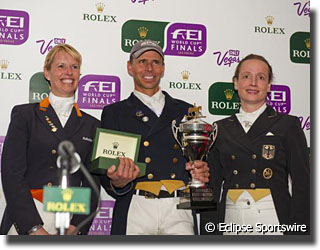|
Sport Psychology
Sport Psychology for Dressage: How to Beat Your Toughest Competitor
by Seana Adamson, Ph.D. - 27th July 2009
 We all have a nemesis, a really tough competitor who always seems to come out on top despite our best efforts. This person is often at a similar skill level, in fact, you might even believe your own skills to be superior. Yet somehow your opponent always seem to get the nod from the judges, while you get snubbed. This can be discouraging and demoralizing, yet there are several strategies you can employ to turn the tables and make the best of this difficult situation. We all have a nemesis, a really tough competitor who always seems to come out on top despite our best efforts. This person is often at a similar skill level, in fact, you might even believe your own skills to be superior. Yet somehow your opponent always seem to get the nod from the judges, while you get snubbed. This can be discouraging and demoralizing, yet there are several strategies you can employ to turn the tables and make the best of this difficult situation.
1. Use your nemesis to help motivate your training at home. Imagine how hard your best competitor is training, and then push yourself to train even harder. If you are already training under saddle as hard as possible then work on your mental game, or your fitness level. Competition is good because it makes everyone better. It pushes all of us to new heights but remember, competitions are mostly won by the training you get done at home.
2. Once you are at competition then narrow your focus. You cannot afford to think about winning or losing, you can only focus on creating your best ride. Watch your nemesis ride only if it makes you ride better. If it distracts you to see them ride, then look away. Keep your mind focused on the details that are important to your own performance. The more you are thinking about the other competitors, the less you are focused on your own performance. Focus on becoming one with your horse.
3. Monitor your negative thinking. Do not let a single bad ride lead to a generalization that you are a bad rider or trainer. Learn from your mistakes and let your problem areas help guide your focus in training. Of course if you regularly perform poorly then you must seek qualified help, but carefully monitor negative thoughts, especially in the middle of your test. Equestrian sports are so inherently difficult because you can be the most talented rider in the world, but if you do not have the right horse then your talent will go unrecognized. Just because someone scores higher than you it does not mean that they are a better human being.
4. Monitor your emotions. I remember riding a young horse in competition against a fierce rival. My horse felt very tense, although it was not obvious to an observer. About half way through the test I felt frustrated and made a rough half halt into a downward transition. The horse stiffened and we lost a few points on that movement. Those few points gave my rival the edge, and I finished second. It was completely my own fault for letting my emotions affect my riding. When I received my test I could see that if not for my rough transition I would have won the class. While we cannot (and should not) always stop a negative emotion, we can choose to behave in a positive way even when we are feeling discouraged or frustrated.
5. After your final salute make a decision about how the test went for you and your horse. If you know that it was really good for you as a team, then the competitive outcome should make little difference to how you feel. Last weekend I rode against my nemesis in a Prix St George. I was on a young horse, doing its first Prix St George. At the end of the test I felt very pleased. Though we’d had some mistakes, the horse had felt confident and comfortable with all of the work in the test. I felt it was a successful first outing, and I held on to that positive impression even when I saw we had not managed to win the class.
6. While you are riding, keep any thoughts of winning or losing out of your mind. Imagine that you are riding in a demonstration or exhibition, rather than a competition. Develop your test riding strategies so that you always have a positive direction to be channeling your mind. An undirected mind is a wandering mind, and a wandering mind can get you into trouble. My book, “Memorize That Dressage Test” gives a number of exercises to help you define your test riding strategies. You can find the book on my web site, www.seanaadamson.com.
In our little world of dressage it is easy to lose perspective on what is truly important. Strive for excellence as a human being, not just a dressage rider. I recently overheard a top dressage rider say, “Be really nice to everyone you pass on your way up because you will pass them again on your way down”.
Please feel free to contact me directly at seanaadams@aol.com with any comments or questions. I enjoy hearing from you.
Related Links
Sport Psychology for Dressage
Performance Anxiety
Staying Motivated
Regaining Confidence
Concentration and Memorization
Warm-Up Arena Strategies
Visualization and Mental Rehearsal
Self-Judgment and Self-Criticism
Eight Rules to Win Your Dressage Test
Five Ways to Breathe for Performance
|
